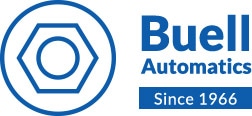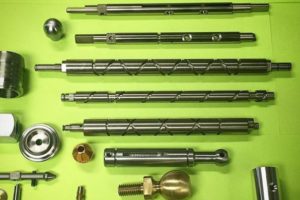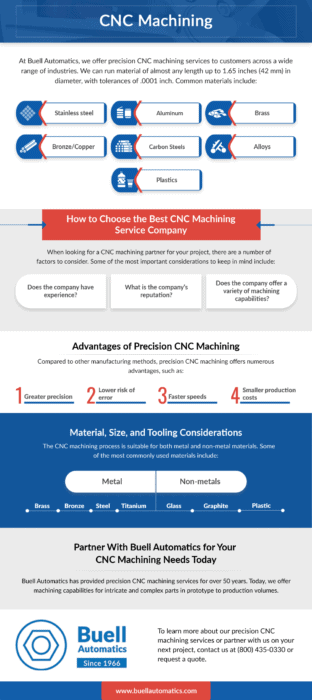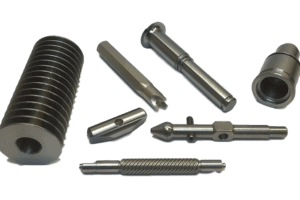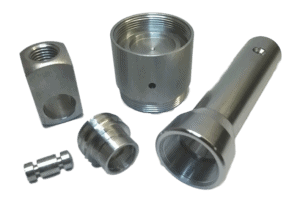At Buell Automatics, we offer precision CNC machining services to customers across a wide range of industries. Armed with extensive industry experience, regularly updated and meticulously maintained late-model equipment, and expert machinists, we have what it takes to provide durable and reliable precision CNC machined parts for virtually any application, regardless of complexity or uniqueness.
Buell’s late model equipment is regularly updated and meticulously maintained to ensure optimized production, whether our clients require prototype, low-volume, high-volume, or blanket orders. Making use of automatic bar feeders, our team is currently running Citizen Swiss Turning machines and Miyano BNA-42MSY machines.
We can run material of almost any length up to 1.65 inches (42 mm) in diameter, with tolerances of .0001 inch. Common materials include:
- Stainless steel
- Aluminum
- Brass
- Bronze/Copper
- Carbon Steels
- Alloys
- Plastics
Why Precision Machining
Precision CNC machining is a subtractive manufacturing process that uses computer-controlled machines and machine tools to produce precision parts and products from human-engineered designs. The process begins with the creation of the design file, which contains all of the technical specifications needed to manufacture the component.
Once the file is completed, the designer exports it to a format that is compatible with the CNC equipment and converts it into a set of instructions for the CNC machine and machine tool. By following these instructions, the CNC equipment is able to machine simple to complex components with excellent accuracy and precision.
In the simplest terms, 5-axis machining involves programming a computer to move a part or cutting tool along multiple axis simultaneously or independently, enabling the creation of very complex parts. CNC machining combines computer-controlled precision with human-engineered design. These processes work well for projects that require excellent repeatability no matter the production run’s size.
How to Choose the Best CNC Machining Service Company
When looking for a CNC machining partner for your project, there are a number of factors to consider. Some of the most important considerations to keep in mind include:
- Does the company have experience? The team at Buell Automatics has more than 55 years of experience providing CNC machining services to customers across a wide range of industries.
- What is the company’s reputation? Throughout our over 50 years in business, we’ve successfully provided high-quality precision components for a variety of customer applications, including automotive fuel emission fittings, automotive brake bleeder screws, fluid control valve fittings, and high-volume threaded insert connectors.
- Does the company offer a variety of machining capabilities? We offer a broad selection of machining capabilities to ensure we can meet all of our customers’ machining needs, including CNC swiss turning and multi-spindle screw machining.
Advantages of Precision CNC Machining
Compared to other manufacturing methods, precision CNC machining offers numerous advantages, such as:
- Greater precision. Precision CNC machining operations generate components with exceptional precision. Since the equipment employed is designed to follow specific instructions with no unprogrammed variation, it can produce parts in large quantities with minimal variation.
- Lower risk of error. Using CNC machines to produce precision CNC machined parts and products minimizes the risk of human error affecting production. Since CNC machines are programmed to perform a set of actions.
- Faster speeds. Computerized machining operations boast better speed than manual machining operations. Additionally, CNC machines can operate continuously without any effect on quality, resulting in greater production capacities.
- Smaller production costs. The precision CNC machining process offers greater precision, lower risk of error, and faster speeds, which translates to smaller labor requirements, and shorter turnaround.
Material, Size, and Tooling Considerations
The CNC machining process is suitable for both metal and non-metal materials. Some of the most commonly used materials include:
- Metal:
- Brass
- Bronze
- Steel
- Titanium
- Non-metals:
- Glass
- Graphite
- Plastic
While the process accommodates all of these materials, some workpieces can be challenging to machine because of their size or weight. Large workpieces may require specialized positioning equipment and/or complex machine setups to fit in the work area of the machining equipment.
They are also more susceptible to accuracy issues, thermal distortion, and stress-related distortion. Heavy workpieces may require specialized handling equipment so they can be lifted to the work area.
Some machining projects may necessitate specialized cutting tools, depending on the part and production specifications. For this reason, some precision CNC machining companies offer in-house toolmaking capabilities so they can produce custom tools for highly specific or unique customer needs.
CNC Machining Aluminum
Aluminum used for CNC machining come in many different grades, and each of which has unique characteristics and uses. A few of the most prevalently used aluminum alloys include:
Aluminum 2011
One of the most popular screw machine stock alloys available. T3 temper offers excellent machinability and surface finish. The Aluminum’s T3 tempers chip are well known for being small in size. Typically used in connectors and fittings, brake pistons, computer parts, knobs and meter shafts.
Aluminum 6061: Lead free
A medium-strength alloy that offers improved corrosion resistance, aluminum 6061 contains magnesium and silicon, which improve its formability and weldability. Common applications include uses in electronic hardware, aircraft fittings, and camera lens mounts.
Aluminum 7075
Lead free, higher strength than aluminum 6061 and has good fatigue strength. It can be machined to build gears, shafts, missile parts, regulating valve parts, keys, and bike frames.
Comparisons Between CNC Machines
While the term “CNC machine” is generally used for computer-controlled machining equipment, it technically applies to any piece of manufacturing equipment that utilizes computerized controls to guide the motions and actions of its tooling. Some of the most common CNC machines used for machining operations include:
- CNC milling machines. CNC milling machines utilize computerized controls to guide rotating, multi-point cutting tools into and across the workpiece. They are available in three-axis to six-axis configurations to suit different part and production specifications.
- CNC lathes. CNC lathes use computerized controls to move rotating workpieces into the path of single-point cutting tools. They are generally used to create cylindrical components with simple to complex external and internal features.
- CNC electric discharge machines. CNC EDMs—also referred to as CNC spark machines—rely on electrical discharge to machine electrically conductive materials into the desired shape and size. They are typically used for materials that are difficult to machine with traditional machining methods, such as hardened steel.
Partner With Buell Automatics for Your Precision CNC Machining Needs Today
Buell Automatics has provided precision CNC machining services for over 50 years. Today, we offer machining capabilities for intricate and complex parts in prototype to production volumes.
Our team is fully committed to quality. This commitment is reflected by our certification with ISO 14001, and compliance with IATF 16949 and ITAR standards.
To learn more about our precision CNC machining services or partner with us on your next project, contact us at (800) 435-0330 or request a quote.
CNC Capabilities
Our CNC machines can handle the following processes:
- Milling
- Drilling
- Boring
- Turning
- Threading
- Tapping
- Thread Milling
We also offer the following secondary services:
- Plating
- Heat Treating
- Painting
- Grinding
- Etching
- Powder Coating
And for enhanced manufacturing, we can provide the following fixturing options:
- Three-jaw chucking
- Four-jaw chucking
- Pallet work
- In-house tooling and fixturing
Added Benefits
Buell’s CNC-related tools and specialties are listed below.
- Bar feeders/chip conveyors
- High-pressure Coolant Through Drilling
- Espirit computer-aided manufacturing (CAM) software for CNC programming, optimization, and simulation
- Measuring equipment, including a coordinate-measuring machine and vision systems to ensure optimal quality
- Lights-Out Capabilities
- SPC Data Collection
- Two Certified Lean & Sigma Green Belts on Staff
Learn More
Our team can produce reliable, long-lasting turned parts for all your company needs, no matter how unusual or complex. With more than 55 years of combined team experience, our expert CNC machinists can help bring your design to life, working with you throughout every step of the process. We leverage our experience with industries that range from the industrial to automotive fields to fulfill your needs.
And with a commitment to quality and safety, we’re proud to meet several key industry standards including compliance to IATF 16949 standard, ITAR (International Traffic In Arms) standard, and ISO 14001 Environmental compliance.
No project is too small for the team at Buell. To get started on your next turned part manufacturing project or learn more about our services, reach out to us today.

